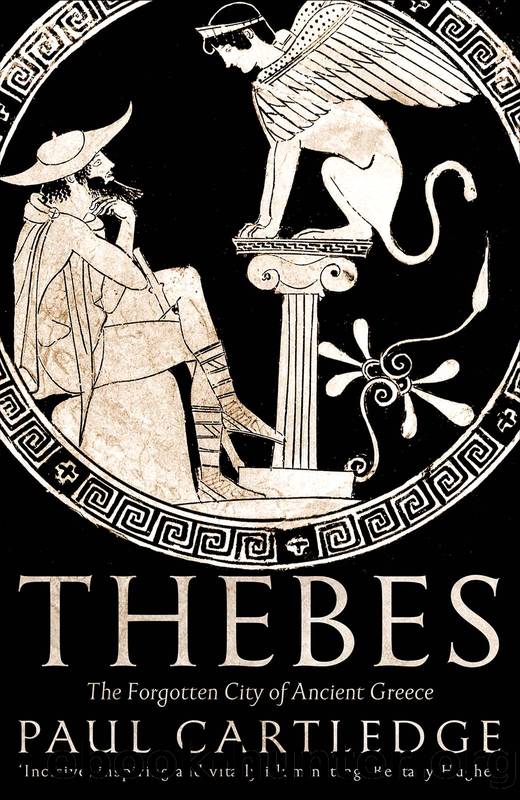Thebes by Paul Cartledge

Author:Paul Cartledge
Language: eng
Format: epub
Publisher: Pan Macmillan UK
CHAPTER 9
Theban Heyday: City of Epaminondas and Pelopidas
Under the remarkable and often joint leadership of Epaminondas and Pelopidas, Thebes achieved an extraordinary flowering in the 370s and 360s, making it temporarily the leading power in all mainland Greece. Indeed, the period of Greek history from 371 to 362, framed between two major battles both won by the Thebans, is often referred to as the ‘Theban hegemony’. Some prefer the more qualified term ‘Theban ascendancy’. Of course, Thebes did not then preside over or dominate anything like the whole of the ancient Greek world, but only much of mainland Greece and some of the Aegean area. ‘Hegemony’, moreover, is used rather than ‘Empire’ to indicate that Thebes’s supremacy was exercised in significantly different ways from the preceding ‘empires’ of Athens or Sparta. All the same, in terms of political, military and diplomatic impact, this was Thebes’s most important and surely proudest historical decade.
If we were to list just some of the high spots, they would have to include: two major victories in pitched battles, the first announcing to a stunned world the demise of Spartan invincibility, the second betraying a secret of empire – that none of the previous holders of the title was any longer capable of exercising it; a great leap forward in federalism, prefiguring the primary role that would be played by federal states in Hellenistic, pre-Roman conquest Greece (and ultimately influencing thereby even the federal United States of America); the foundation of the original Megalopolis (so named) – as a federal capital; the liberation and enfranchisement of a long-enslaved mass of Greek humanity, and the construction of a walled city for those emancipated, the remains of which still excite the admiration of posterity; and the career of an individual deemed by an acute English judge to be ‘the worthiest man that ever was bred in that nation of Greece’.
Even the greatest of ‘great men’ cannot make history happen just like that, however. But heroes such as the Thebans Epaminondas and Pelopidas do mark their societies and epochs in powerful ways. Besides his extraordinary military, political and diplomatic talents, Epaminondas was also an intellectual, indeed something of a philosopher of a broadly Pythagorean persuasion.
This was a combination that appealed strongly to Sir Walter Raleigh, languishing in the Tower of London under the dictates of first Elizabeth I and then James I. It was he who, in the third volume of his posthumous History of the World, pronounced Epaminondas the ‘worthiest’ of all the ancient Greeks. Among his qualities of the very highest distinction, Raleigh discerned in Epaminondas justice, sincerity, temperance, wisdom, and magnanimity, allied with graces including eloquence, and of course those virtues that were required to make him ‘an heroic general’. In sum, he was hardly to be matched in any age or country; for he ‘equalled all others in the several virtues which in each of them were singular’ (emphasis in the original).
It’s a verdict I’m inclined to share. But ancient anti-intellectuals preferred to sneer at him.
Download
This site does not store any files on its server. We only index and link to content provided by other sites. Please contact the content providers to delete copyright contents if any and email us, we'll remove relevant links or contents immediately.
| Africa | Americas |
| Arctic & Antarctica | Asia |
| Australia & Oceania | Europe |
| Middle East | Russia |
| United States | World |
| Ancient Civilizations | Military |
| Historical Study & Educational Resources |
Mythos (2019 Re-Issue) by Stephen Fry(1568)
Alexander the Great by Robin Lane Fox(1358)
On Sparta (Penguin Classics) by Plutarch(1192)
Antigone Rising: The Subversive Power of the Ancient Myths by Helen Morales(1142)
Persian Fire by Tom Holland(1085)
The Last Days of Socrates by Plato & Christopher Rowe & Plato(1017)
The Classical World: An Epic History From Homer to Hadrian by Robin Lane Fox(1009)
Cicero by Anthony Everitt(995)
The Athenian Constitution (Classics) by Aristotle(947)
Antigone Rising by Helen Morales(845)
The Greek World(823)
The Riddle of the Labyrinth(820)
The Story of the Greeks (Yesterday's Classics) by Guerber H. A(798)
The Homeric Hymns (Penguin Classics) by Homer(755)
The End of the Bronze Age by Robert Drews;(745)
The Eudemian Ethics (Oxford World's Classics) by Kenny Anthony(741)
Guide to Greece by Pausanias(732)
Lords of the Sea: The Epic Story of the Athenian Navy and the Birth of Democracy by John R. Hale(708)
A History of My Times (Classics) by Xenophon(708)
